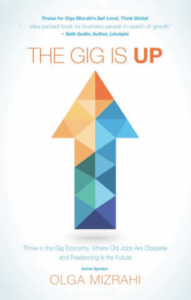Piers Cain reviews the sharp guide to the gig economy that reveals that too many freelancers chase ‘likes’ over fees
Most of us will have heard of the ‘gig economy’, and probably associate it with internet-enabled businesses popular with the Millennial generation – Uber being an example. Olga Mizrahi, a digital marketing expert, has produced a slim ‘how-to’ guide for those contemplating making a living in this growing sector.
Why should we care? According to a report by the McKinsey Global Institute in 2016, between 20-30% of the working age population in the US and EU-15 engaged in independent work, and 10-15% relied on this as their primary income. In the US, this could grow to between 30% and 50% in future. So, at some point this might be you.
What do we mean by the gig economy? Mizrahi’s definition is vague: “Project-based on-demand services that can be provided by anyone” – which could be anyone from a plumber from this page, relying on word-of-mouth, through to drivers booked through Uber, people writing marketing blurbs via Freelancer, through to self-employed management consultants or other professionals. To a degree, this imprecision reflects reality. There are blurred lines between casual work, temporary work leading to full-time employment and start-up consultancies aiming to grow. Nonetheless, something is definitely happening.
Who should read this book? It is mainly aimed at entry-level twentysomethings who have had only a basic introduction to the world of work, and who live (or are planning to work) in the United States. Most of the examples given are of platforms popular in the US, and advice on law and financial planning is very specific to the US context. More experienced readers might be mildly irritated that for a slim book (161 pages), space is taken up explaining that “taxes are the sum of money levied upon incomes and demanded by the government for its support” – and why this matters. On the plus side, Mizrahi provides a short, high-level and practical introduction to all aspects of being a freelancer: from how to develop your value proposition through to using online apps to get work; time management; good practice and ethical behaviour; coping with bad reviews or rejection; and developing your career. Much of this advice could have been written ten years ago – and is none the worse for that –but as Mizrahi shows, some things have changed.
This brave new world can be a bleak place. Mizrahi is particularly interesting on the traps and pitfalls of this internet-enabled market place. One is ‘gamification’ – designed-in features that exploit our psychology to encourage certain forms of behaviour. This can lead to a sort of addiction where the worker becomes hooked into carrying out activities that benefit the platform provider in return for psychological reward (chasing ‘likes’, for example), but provide the worker with no actual income. Also some types of work can be done for clients anywhere in the world. The risk here is that workers from industrialized countries may find themselves competing on price with workers in emerging markets prepared to accept much lower pay. Bad news if you are based in a rich country.
The author is also sound on the need to continually invest in developing one’s own skills, and to provide for the future in terms of pensions and the like. A risk of taking on only entry-level tasks is that one becomes trapped in a short-term mindset. Moreover, you are only as good as your last gig; so, freelancers must aim to produce excellent work every time. There are few second chances.
Mizrahi is clear that freelancers should aim to be gradually increasing the value of their services and the amount of repeat business. I am left with the feeling that the best outcome for the freelancer would be to reach a position when she could ditch the tyrannical online platforms, work with a small number of regular clients – to ensure stability of income – on projects of increasing length and value. The internet-enabled gig economy may be a useful place to start out, or be a way of finding new clients from time to time, but it is not a comfortable destination.
— Piers Cain is a management consultant
— The Gig is Up: Thrive in the Gig Economy, Where Old Jobs Are Obsolete and Freelancing Is the Future by Olga Mizrahi, Greenleaf Book Group Press, 2018


